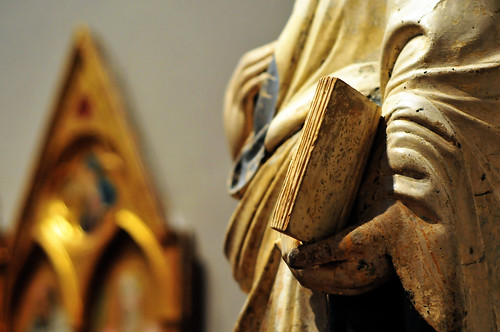by Christie Purifoy | Sep 30, 2011 | book of quotations, Poetry

I keep a book of quotations. It looks exactly like any other journal, but it’s for a different kind of journaling. Journaling with the words of other writers, if you will. Here I scribble down quotations from all kinds of books: poetry, theology, memoir, literary theory, fiction, you name it. I write down anything I want to remember.
Sometimes I use these quotations later, in my own writing or maybe just in conversation. But, it isn’t really about utility. It’s about beauty. Language can be so beautiful it stuns. However, I am generally reading so much, so quickly that I need a way to hold on to those beautiful bits that I just can’t bear to let wash down the stream of words, words, words.
In The Poetics of Space the French philosopher* Gaston Bachelard tells us that “the house shelters day-dreaming, the house protects the dreamer, the house allows one to dream in peace.”
That is pure poetry and reminds me, once again, that I will always find more truth in poetry (and myth, and story, and art) than in the dictionary.
Like many introverts, I imagine, I am happiest when in my own home. I also love the purely abstract idea of houses. As a middle-schooler, I wanted to be an interior designer. As an almost-college student, I considered architecture. Ultimately, my desire for fame and fortune led me to study literature. (For those perhaps unfamiliar with the current job market in the humanities, I should explain: that was a joke.)
After ten years of English lit. and babies, I finally did finish with school, and we left Chicago. I have missed my Chicago home for one year and six months. When I picture what it is that I miss, I see what Bachelard prompts me to call my “dreaming spot.” A soft green chair is huddled up against a corner window. A tall built-in bookshelf is just on the other side of the window, and through the glass there are rooftops with one-hundred year old chimneys and treetops that shift from bare, to bright green, to rich green, to shades of fire, and back again.
When I leave this Florida house, I am sure that I will miss the big bay window that shelters my writing desk. I still have the soft, green chair, but I no longer spend much time there. I prefer the hard-backed desk chair, here by the window, where I can see vegetable beds, ripening citrus, water, and (when I’m lucky) river otters. Right now, this is my spot for dreaming.
For me, one of the saddest and most troubling verses in the Bible is Matthew 8:20 where Jesus tells us, “‘Foxes have holes and birds of the air have nests, but the Son of Man has no place to lay his head.’” To follow Jesus, is to say, “Lord, I will make my home in you.”
But we have also been given a promise. In John 14:2 Jesus says, “’In my Father’s house are many rooms . . . I am going there to prepare a place for you.’”
I love houses, mine (wherever it happens to be) most of all. I simply cannot imagine having no place (let alone a cozy, book-filled place) to lay my head. And so I stumble upon yet one more difficult, beautiful paradox: my desire for Home is God-given and good, but this fact gives me no right to hold my house in a possessive, white-knuckled grip.
“Then Jesus said to his disciples, ‘If anyone would come after me, he must deny himself and take up his cross and follow me. For whoever wants to save his life will lose it, but whoever loses his life for me will find it.’”
(Matthew 16: 24-25)
*Lest anyone formulate an unduly high regard for my intellectual habits, I must admit that I do not actually spend my days reading French philosophy. I encountered this quotation in the travel section of my Sunday New York Times. Poetry can find us in the most surprising places.
by Christie Purifoy | Sep 15, 2011 | book of quotations

I keep a book of quotations. It looks exactly like any other journal, but it’s for a different kind of journaling. Journaling with the words of other writers, if you will. Here I scribble down quotations from all kinds of books: poetry, theology, memoir, literary theory, fiction, you name it. I write down anything I want to remember.
Sometimes I use these quotations later, in my own writing or maybe just in conversation. But, it isn’t really about utility. It’s about beauty. Language can be so beautiful it stuns. However, I am generally reading so much, so quickly that I need a way to hold on to those beautiful bits that I just can’t bear to let wash down the stream of words, words, words.
The purple fabric cover of my book of quotations has caught my eye this morning. Cracking its cover and skimming its pages, I rediscover this gem from George MacDonald.
In his classic fantasy Phantastes, first published in 1858, he writes words worth remembering:
” . . . I went on my silent path beneath a round silvery moon. And a pale moon looked up from the floor of the great blue cave that lay in the abysmal silence beneath. Why are all reflections lovelier than what we call the reality? – not so grand or strong, it may be, but always lovelier? Fair as is the gliding sloop on the shining sea, the wavering, trembling, unresting sail below is fairer still. Yea, the reflecting ocean itself, reflected in the mirror, has a wondrousness about its waters that somewhat vanishes when I turn towards itself. All mirrors are magic mirrors. The commonest room is a room in a poem when I turn to the glass. . . . In whatever way it may be accounted for, of one thing we may be sure, that this feeling is no cheat; for there is no cheating in nature and the simple unsought feelings of the soul. There must be truth involved in it, though we may but in part lay hold of the meaning. Even the memories of past pain are beautiful; and past delights, though beheld only through clefts in the grey clouds of sorrow, are lovely as Fairy Land. . . . The moon . . . is the lovelier memory or reflex of the down-gone sun, the joyous day seen in the faint mirror of the brooding night . . . .”
What do you see in the photo above?
Because we live in a world which privileges cold, hard facts, I imagine that each of us would claim to see only a reflection. The camera isn’t showing us the real things, the actual palm trees and beach balls.
I begin to wonder: is the reflection, the mirror image, actually less real? Less true?
I flip through the pages of an old photo album. I remember the pain and pleasure of those days, and I discover that MacDonald is right, those memories, the good and bad, are glossed with loveliness. Should I distrust this loveliness? Should I insist that the distance of years has distorted reality?
Perhaps the haze of beauty which covers my memories reveals the truth about my life in a way that immediate, lived experience cannot. Yes, pain is real and terrible, but it may be that in the mirror reflection of memory we can glimpse something important that is beyond our comprehension in the moment.
When pain is part of a good and beautiful story it can be transformed. It can become moonlight.
Yes, I love the direct, unmediated happiness of sunshine. Still, I am grateful for the subtle beauty and the reflected glory that belong only to moonlight.
by Christie Purifoy | Aug 30, 2011 | book of quotations, God's Love

I keep a book of quotations. It looks exactly like any other journal, but it’s for a different kind of journaling. Journaling with the words of other writers, if you will. Here I scribble down quotations from all kinds of books: poetry, theology, memoir, literary theory, fiction, you name it. I write down anything I want to remember.
Sometimes I use these quotations later, in my own writing or maybe just in conversation. But, it isn’t really about utility. It’s about beauty. Language can be so beautiful it stuns. However, I am generally reading so much, so quickly that I need a way to hold on to those beautiful bits that I just can’t bear to let wash down the stream of words, words, words.
During our recent vacation, I read Ian Morgan Cron’s Jesus, My Father, the CIA, and Me: A Memoir of Sorts.
It fully lives up to its title. Which means that the story it tells is crazy and beautiful, wise and, frequently, very, very funny.
Toward the end of his story, Cron describes the life-changing moment when he hears (or thinks he hears) the voice of Jesus asking him, Cron, for forgiveness. These words heal an ugly wound in Cron’s heart, but they puzzle him too.
He knows in his head that Jesus is perfect. Knows that there can never be any reason why He would need to ask for forgiveness.
When asked, theologians, pastors, and priests consistently fail to unravel this apparent contradiction. Finally, a woman named Miss Annie, a woman with no seminary training, does exactly that. She tells Cron, “Why wouldn’t Jesus humble himself and tell a boy he was sorry for letting him down if he knew it would heal his heart?” Cron interrupts with what he knows: “But if Jesus is perfect?”
“Miss Annie ambled the five or six feet that separated us and took my hand. ‘Son,’ she said, rubbing my knuckles with her thumb, ‘love always stoops.’”
Since finishing the book, I’ve been considering the truth of Miss Annie’s words. I can remember years where the things I knew about God seemed to stand like a wall between me and His love. Learn just a little bit about God’s power, his glory, his holiness . . . do that, and it can be hard to fit your own miserable, tiny little self into the picture.
Maybe there are those who can hear a Sunday School lesson on God’s love and then feel it in their bones. All I really know is that it didn’t work that way for me. Perhaps my head and my heart are farther apart than they should be.
I will always be grateful that Love stooped down and came looking for me. Like Miss Annie said, Love humbles itself, Love stoops, and what this means to me is that Love pursues. Love chases. Love makes itself small enough for even our short-sighted, human eyeballs.
Love searches desperately for one lost sheep, and love keeps on searching until that sheep is safe, until that sheep knows and feels that she is loved.
by Christie Purifoy | Jul 15, 2011 | book of quotations, Religion

I keep a book of quotations. It looks exactly like any other journal, but it’s for a different kind of journaling. Journaling with the words of other writers, if you will. Here I scribble down quotations from all kinds of books: poetry, theology, memoir, literary theory, fiction, you name it. I write down anything I want to remember.
I recently finished Amy Boesky's memoir What We Have, in which she describes her attempts to live unafraid despite the hereditary cancer that had killed nearly every woman in her family. Toward the end, she writes: "Now, I wanted to ask the right questions, not give the right answers. Was that what it meant to grow up?"
This is exactly what growing up has meant for me. Fewer answers. Better questions. So much less fear.
When I was a child, I assumed that the adults around me had all the answers. Maybe all kids think that. I imagine it's the only way to keep the enormity of the whole strange, unfamiliar world at bay.
Here are just a few of the things I once thought I knew (or, at the very least, was sure I would know once I found the exact right book or expert): what happens when we die, why the innocent suffer, the eternal fate of those who've never heard the name Jesus, how to get children to sleep all night in their own beds . . . I'll stop there, but, trust me, I could go on.
I'm afraid that I, like so many Christians, have taken the imperative in I Peter to "be prepared to give an answer to everyone who asks you to give the reason for the hope that you have" just a little too far.
There is only one answer that we can all give with total confidence: Jesus.
Do we need to have answers neatly packaged for every question that plagues our culture (gay marriage, government debt, capital punishment, organic food vs locally grown)? Big, important questions proliferate all around us on a daily basis, and I applaud those who are (let's recall the rest of I Peter 3: 15 here), with "gentleness and respect," seeking out answers. But our faith does not rest on these things.
It's okay to say, "I don't know." More often than not, it's the only honest answer we can give.
"Now we see but a poor reflection as in a mirror, then we shall see face to face. Now I know in part; then I shall know fully, even as I am fully known" (I Corinthians 13: 12).
If answers were what really mattered, we would be given them. Instead, we've been told to love and not to fear. We can't go wrong if we stick to that.
One day every question will be answered (and I imagine that many questions will simply disappear because they never really mattered). These answers will come, not with words, but in a face. We shall see face to face.
In his novel Till We Have Faces, C.S. Lewis, an English professor who loved words, put words in their proper place: "I know now, Lord, why you utter no answer. You are yourself the answer. Before your face questions die away. What other answer would suffice? Only words, words; to be led out to battle against other words."
I too love words, but words can’t get me out of bed some days. On those days, I get up and keep going only because I glimpse the face of the One who made me, the One who knows me, the One who yet loves me.
by Christie Purifoy | Jun 27, 2011 | book of quotations, Books, Religion
I keep a book of quotations. It looks exactly like any other journal, but it’s for a different kind of journaling. Journaling with the words of other writers, if you will. Here I scribble down quotations from all kinds of books: poetry, theology, memoir, literary theory, fiction, you name it. I write down anything I want to remember.
Sometimes I use these quotations later, in my own writing or maybe just in conversation. But, it isn’t really about utility. It’s about beauty. Language can be so beautiful it stuns. However, I am generally reading so much, so quickly that I need a way to hold on to those beautiful bits that I just can’t bear to let wash down the stream of words, words, words.
Over the weekend, I added a new quotation to my book. It comes from the spiritual memoir Take This Bread by Sara Miles. Writing about her conversion as a “process” rather than a “moment,” she says that she struggled with belief: “It was tempting to rely on a formula – ‘accepting Jesus Christ as your personal Lord and savior,’ for example – that became itself a form of idolatry and kept you from experiencing God in your flesh, in the complicated flesh of others. It was tempting to proclaim yourself ‘saved’ and go back to sleep.”
I’ve placed these words near a quotation from Annie Dillard. In Pilgrim at Tinker Creek, she writes: “We wake, if we ever wake at all, to mystery.”
I cannot say comprehensively what it looks like to be a follower of Jesus who is fully awake. I do think that it has more to do with the mysteries of relationship than the certainties of formula. By mystery, I do not mean, doubt. Or, not exactly. I mean something closer to a journey of discovery that will never be finished on this side of life.
Over the years, my views on so many things have evolved. Actually, “evolved” might be putting it too delicately. In many cases, I have simply changed my mind. I’ve changed my mind about everything from politics and theology to whether or not I like blue cheese (turns out, I do). I’ve also decided that the number of questions I cannot answer far outweighs those that I can.
To be wide-eyed awake is to know that this life is not about having the right answer for everyone else’s wrong. Fully awake, I am aware of all that defies explanation. Bread and wine that is body and blood. My own self being made new. A divine love saying, rightly, that I have nothing to fear even while the earth is quaking.
Embracing mystery, I know that only the living Word is capacious enough to hold (in fact, to be) Truth. In humility, I accept that the little boxes in which I hold my little answers are only first steps toward a Maker who is more loving and more good than I ever dreamed. Unlike The Wizard of Oz, it is the waking life that is colorful, beautiful, and strange. Only the dream is black and white.

(photo by yours truly)
by Christie Purifoy | Jun 13, 2011 | book of quotations, Books, Religion

I recently jotted down a few lines from Barbara Brown Taylor’s Leaving Church: A Memoir of Faith. Describing the honeysuckle and magnolia blossoms in her Atlanta neighborhood, she writes: “All these earthly goods were medicine for what ailed me, evidence that the same God who had breathed the world into being was still breathing.”
Generally, I imagine the act of divine creation as an over and done deal. God spoke. God breathed. Past tense.
Taylor’s words offer the best kind of literary shock: the shock of confronting a truth we know but have never really considered. A truth that suddenly appears, not only obvious, but vitally important.
Reading these few words, everything in me responds, “Yes, of course.” For creation, the very breath of God, continues to unfurl every moment.
I hear a whispered breath in the utterly unique daily bloom of my morning glory vine. Each morning a new flower or two. There is also my own breath. Inhalation and exhalation require no act of decision or effort on my part. I can’t claim them. They are given to me, again and again, whether I think of them or not.
This moment by moment gift of breath would seem to be unadulterated good news, but, for me, it is also a source of fear. I grew up with asthma, can still feel that whistling wheeze in my chest, and when my own son struggles to breathe I feel, not only empathy, but fear. I can’t take breathing for granted, and my personal phobias are all rooted in this fact. Some people fear spiders or heights. For me, it’s something innocuous like scuba diving. Each breath measured from a tank, and a weight of water on my shoulders: this is someone’s idea of a vacation, but it feels like a nightmare to me.
It is only when I consider the character of the gift-giver (He is good. He is love. His plans are not to harm me.), that I can trade fear for peace. I cannot provide for myself the one thing I need most: breath. Fortunately, the one who can knows my needs better than I do and loves me more than I love myself. Even better, His love for my son swallows my own puny love. I can administer an inhaler and an epi-pen, but the God who made us, who loves us, who holds us, can breathe life.
In response, I breathe back my thanksgiving. Why do we sing our praises to God? As a friend(and talented musician) once shared with our church, we sing in order to give back to God that which he first gave us. Breath.
“And the Lord God formed man of the dust of the ground, and breathed into his nostrils the breath of life; and man became a living soul”
(Genesis 2: 7).





